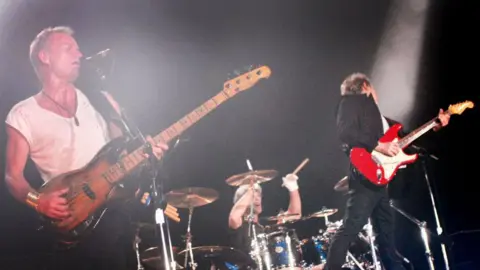
Sting has been sued by his former bandmates in The Police over alleged lost royalties for the songs they recorded together between 1977 and 1984.
In a civil case filed at the High Court, guitarist Andy Summers and drummer Stewart Copeland claim they have been underpaid for their contributions to songs like Roxanne and Every Breath You Take.
Although they did not receive writing credits on those songs, they say the band entered an “oral agreement” to share income in 1977, which was later formalised in written contracts.
Sting, who wrote all of The Police’s biggest hits, denies underpaying his bandmates. In court documents, his lawyers called the claims “illegitimate.”
‘Very dark’ history
The Police formed in 1977 and quickly became one of the UK’s most commercially successful bands.
They earned a US number one single with Every Breath You Take, taken from their fifth album, Synchronicity, in 1983.
It was later recognised as the most-played radio song of all time and was heavily sampled on P Diddy and Faith Evans’ 1997 song I’ll Be Missing You.
However, the band split up in 1984 amid personal and musical animosity.
Copeland later told The Guardian that the band “beat the crap out of each other” during the “very dark” recording sessions for Synchronicity.
In 2022, Sting, whose real name is Gordon Sumner, said he felt the band were holding him back.
“My frustration was I would have written an album’s worth of material but also had to entertain these other songs that were not as good,” he told Mojo Magazine.
“Explaining to someone why their song isn’t working is a bit like saying their girlfriend’s ugly. It’s a very personal thing… That pain was something I didn’t want to go through any more.”

Although Sting was the band’s primary songwriter, the other members both made contributions to their albums, and Summers has often claimed that he originated the iconic guitar riff on Every Breath You Take.
In 1977, documents submitted to the High Court show the band agreed that, when any one member received publishing income for a song they’d written, they would share a percentage of that money, usually 15%, with the other two members, in what was termed an arranger’s fee.
In the court documents, none of the members agree on how that arrangement came into place.
Summers recalls it taking place on the street outside their manager, Miles Copeland’s office in Notting Hill.
Sting, however, contended there was no “oral agreement” – but that Copeland had floated the idea during a visit to his flat in Bayswater to help “keep things sweet” with his bandmates, who were not present.
Either way, the agreement was formalised in 1981 and revised again in 1995 and 2016.

The current legal dispute centres around which categories of publishing income Summers and Copeland should receive compensation.
It’s a complicated area, but royalties are generally split into two separate categories:
- Performance royalties – which are paid when a song is played in public, on the radio, or via a streaming service.
- Mechanical royalties – paid when a song is pressed to CD or vinyl, but also when it is streamed on demand.
Summers and Copeland argue that they should be paid for both of these categories, while Sting says their agreement only covers mechanical royalties.
Sting’s lawyers further contend that, under the terms of the band’s 2016 agreement, all three members agreed not to pursue any historic or future claims over royalties.
His bandmates claim that does not stop them disputing the terms of the 2016 agreement.
They claim a loss of about £1,500,000. Sting’s lawyers denied they had been underpaid and argued that, in fact, Summers and Copeland may owe him money that has been overpaid to them.
In 2022, the musician sold the rights to his songwriting catalogue to Universal Music Group, with the deal covering both his solo hits and songs he penned for the Police.
The deal was estimated to be worth $200 million (£149 million).